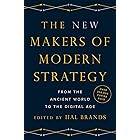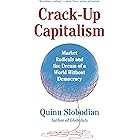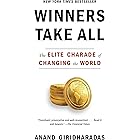| Digital List Price: | $14.99 |
| Kindle Price: | $9.99 Save $5.00 (33%) |
| Sold by: | Amazon.com Services LLC |
Your Memberships & Subscriptions

Download the free Kindle app and start reading Kindle books instantly on your smartphone, tablet, or computer - no Kindle device required.
Read instantly on your browser with Kindle for Web.
Using your mobile phone camera - scan the code below and download the Kindle app.

OK
 Audible sample Sample
Audible sample Sample 


The Ideas Industry: How Pessimists, Partisans, and Plutocrats are Transforming the Marketplace of Ideas 1st Edition, Kindle Edition
- ISBN-13978-0190264604
- Edition1st
- PublisherOxford University Press
- Publication dateMarch 1, 2017
- LanguageEnglish
- File size2947 KB
Customers who bought this item also bought
Editorial Reviews
Review
About the Author
Product details
- ASIN : B06X9CL2NL
- Publisher : Oxford University Press; 1st edition (March 1, 2017)
- Publication date : March 1, 2017
- Language : English
- File size : 2947 KB
- Text-to-Speech : Enabled
- Screen Reader : Supported
- Enhanced typesetting : Enabled
- X-Ray : Not Enabled
- Word Wise : Enabled
- Sticky notes : On Kindle Scribe
- Print length : 356 pages
- Best Sellers Rank: #1,229,185 in Kindle Store (See Top 100 in Kindle Store)
- #379 in Globalization (Kindle Store)
- #614 in Media & Internet in Politics (Books)
- #1,223 in Media Studies (Kindle Store)
- Customer Reviews:
About the author

Daniel W. Drezner is professor of international politics at the Fletcher School of Law and Diplomacy at Tufts University and a non-resident senior fellow at the Brookings Institution. Prior to Fletcher, he taught at the University of Chicago and the University of Colorado at Boulder. He has previously held positions with Civic Education Project, the RAND Corporation and the U.S. Department of the Treasury, and received fellowships from the German Marshall Fund of the United States, the Council on Foreign Relations, and Harvard University. He received his B.A. in political economy from Williams College and an M.A. in economics and Ph.D. in political science from Stanford University. Drezner is the author of four books -- most recently, Theories of International Politics and Zombies -- and the editor of two others. He has published articles in numerous scholarly journals as well as in the New York Times, Wall Street Journal, Washington Post, The New Republic, and Foreign Affairs. Time magazine named Drezner's blog as one of the best in 2012. For more about Drezner and his work, visit his website at www.danieldrezner.com.
Customer reviews
Customer Reviews, including Product Star Ratings help customers to learn more about the product and decide whether it is the right product for them.
To calculate the overall star rating and percentage breakdown by star, we don’t use a simple average. Instead, our system considers things like how recent a review is and if the reviewer bought the item on Amazon. It also analyzed reviews to verify trustworthiness.
Learn more how customers reviews work on Amazon-
Top reviews
Top reviews from the United States
There was a problem filtering reviews right now. Please try again later.
The Ideas Industry is not as funny but it is even more insightful. I write it as someone who is on the fringes of the world he writes about and, at times, hopes to be closer to its center. After reading this thought provoking book, I'm happier being on the fringes.
Drezner does a terrific job of outlining the way organizations like AEI, Brookings, and the Carnegie Endowment work (all of which I can see out my office window). He also does a terrific job of laying out the strengths and weaknesses of what he calls public intellectuals and thought leaders.
I really recommend the book, first, because I don't agree with all of his conclusions, especially his criticisms of "disruptive" thought leaders like Clayton Christensen. However--and this is the key--he made me think. Here, in particular, he talks about the so-called Overton Window that essentially defines what the ideas industry and the rest of us think should be at the heart of the public policy debate. He opened mine a bit more.
I really recommend it, second, because of the last chapter. Rarely do last chapters of books add much. This one does. It has much of the wit I found in zombies and, more importantly, a lot more self-reflection and self-awareness than one normally finds in books by or about the ideas industry. And, he draws heavily on one of my favorite books that he also takes very seriously, Kathryn Schulz's Being Wrong.
I've never met Drezner, but I hope to so he can talk about zombies with my grandson, and he and I can have fun discussing being wrong. I'm not sure which conversation will be more fun.
This is an interesting, easily readable book. It is not a fountain of wisdom on what "should be" however, it is reasonably balanced assessment from an academic. The book inventories sources of policy ideas, in particular focusing on the role of academia as experts. The section on think tanks is interesting, brought back memories, McKinsey both praised and panned. Other think tanks are portrayed positively/negatively (Tetlock’s analyses on accuracy of “experts” for forecasting are incisive … experts less accurate than amateurs … references Superforecasting but "Expert Political Judgment: How Good Is It? How Can We Know?" is the book to get). Drezner explains Heritage Foundation, how it went downhill after DeMint took over moving to ideological instead of pursuit of intellectual rigor in advancement of ideas. He explains that ideological polarization has come to universities however, still advocates professors entering into the public ideas game, being the foxes in the Berlin parable in contrast to TED talkers and idea evangelists who are hedgehogs capably pushing their one idea (Tetlock offers detailed histories and data for how the hedgehogs fail, fixated on the one thing they are "experts").
A example from my past of pushing the 1 big idea is a professor turned consultant pushing a "new" methodology, actually a warmed over version of Porter’s work, new packaging. It was obvious he had no idea how to operationalize it, learning from his clients, not an uncommon consultant practice. Some of the orthodoxy was unusable but company staff plugged on, doing what they were told. This was during the heady days of mid 1990's re-engineering and "revolutionary" management thinking. Reading this book brought back the memory of evangelism triumphing over common sense.
Among other things, this is a survey of how new ideas on public policy are brought forth. Denzer goes on to describe major policy "thought leader types", with significant criticisms surrounding each. Then he launches into an exposition on whether the ideas industry “works”. There is a discussion of the business side, more detailed on Clayton Christensen and the theory of disruption ... including how “disruption” hit a pothole with criticisms about whether it was well founded and its (in)applicability outside of business.
Second last short chapter is on tweeting, retweeting, online debates. Interesting anecdotes, not insights you can use. Last one is a recap of views found throughout the book. The book is readable because filled with real stories to illustrate points, sometimes more than needed, entertaining throughout.
It's worth your time but don't look for anything you can put to immediate use.












